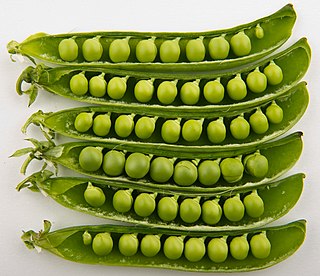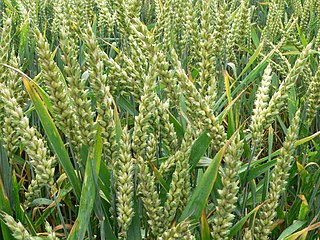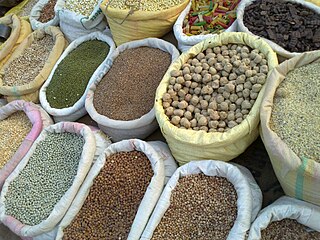
A bean is the seed of several plants in the family Fabaceae, which are used as vegetables for human or animal food. They can be cooked in many different ways, including boiling, frying, and baking, and are used in many traditional dishes throughout the world.

The chickpea or chick pea is an annual legume of the family Fabaceae, subfamily Faboideae. Its different types are variously known as gram or Bengal gram, chhana, chana, or channa, garbanzo or garbanzo bean, or Egyptian pea. Chickpea seeds are high in protein. It is one of the earliest cultivated legumes, and 9500-year-old remains have been found in the Middle East.

The pea is most commonly the small spherical seed or the seed-pod of the flowering plant species Pisum sativum. Each pod contains several peas, which can be green or yellow. Botanically, pea pods are fruit, since they contain seeds and develop from the ovary of a (pea) flower. The name is also used to describe other edible seeds from the Fabaceae such as the pigeon pea, the cowpea, and the seeds from several species of Lathyrus.

Hummus, also spelled hommus or houmous, is a dip of Arab origin, spread, or savory dish made from cooked, mashed chickpeas blended with tahini, lemon juice, and garlic. The standard garnish in the Middle East includes olive oil, a few whole chickpeas, parsley, and paprika.

Falafel is a deep-fried ball or patty-shaped fritter of Arab origin, featuring in Middle Eastern cuisine made from broad beans, ground chickpeas, or both.

Vicia faba, commonly known as the broad bean, fava bean, or faba bean, is a species of vetch, a flowering plant in the pea and bean family Fabaceae. It is widely cultivated as a crop for human consumption, and also as a cover crop. Varieties with smaller, harder seeds that are fed to horses or other animals are called field bean, tic bean or tick bean. Horse bean, Vicia faba var. equinaPers., is a variety recognized as an accepted name. This legume is very common in Southern European, Northern European, East Asian, Latin American and North African cuisines.

A legume is a plant in the family Fabaceae, or the fruit or seed of such a plant. When used as a dry grain, the seed is also called a pulse. Legumes are grown agriculturally, primarily for human consumption, for livestock forage and silage, and as soil-enhancing green manure. Well-known legumes include beans, soybeans, chickpeas, peanuts, lentils, lupins, grass peas, mesquite, carob, tamarind, alfalfa, and clover. Legumes produce a botanically unique type of fruit – a simple dry fruit that develops from a simple carpel and usually dehisces on two sides.

Koshary, kushari or koshari is Egypt's national dish and a widely popular street food. It is a traditional Egyptian staple, mixing pasta, Egyptian fried rice, vermicelli and brown lentils, and topped with a zesty tomato sauce, garlic vinegar and garnished with chickpeas and crispy fried onions. It is often served with sprinklings of garlic juice; garlic vinegar and hot sauce are optional.

A purée is cooked food, usually vegetables, fruits or legumes, that has been ground, pressed, blended or sieved to the consistency of a creamy paste or liquid. Purées of specific foods are often known by specific names, e.g., applesauce or hummus. The term is of French origin, where it meant in Old French purified or refined.

Bean salad is a common cold salad composed of various cooked beans – typically green, wax, kidney, and/or lima beans - tossed in a sweet-sour vinaigrette. Variant ingredients include fresh raw onions, bell pepper, and/or other cooked or raw vegetables, such as chickpeas.
Black peas, also called parched peas or dapple peas, are cooked purple-podded peas. They are a traditional Lancashire dish usually served with lashings of malt vinegar, and traditionally on or around Bonfire Night. The dish is popular in Bury, Preston, Rochdale, Oldham, Wigan, Bolton, Atherton, Tyldesley Leigh and Heywood. The dried peas are soaked overnight and simmered to produce a type of mushy pea. Parching is a now-defunct term for long slow boiling.
Tasty Bite is an Indian-American preserved food manufacturer, producing ready-to-eat Indian and pan-Asian food products. The products require no cooking, contain no preservatives, and require no refrigeration.

Rabi crops or rabi harvest, also known as winter crops, are agricultural crops that are sown in winter and harvested in the spring in India, Pakistan and Bangladesh. Complementary to the rabi crop is the kharif crop, which is grown after the rabi and zaid (zaa-id) crops are harvested one after another respectively.
Arrowhead Mills is a brand of organic baking mixes, grains, cereals, and nut butters.

A grain is a small, hard, dry fruit (caryopsis) – with or without an attached hull layer – harvested for human or animal consumption. A grain crop is a grain-producing plant. The two main types of commercial grain crops are cereals and legumes.

A staple food, food staple, or simply a staple, is a food that is eaten often and in such quantities that it constitutes a dominant portion of a standard diet for an individual or a population group, supplying a large fraction of energy needs and generally forming a significant proportion of the intake of other nutrients as well. For humans, a staple food of a specific society may be eaten as often as every day or every meal, and most people live on a diet based on just a small variety of food staples. Specific staples vary from place to place, but typically are inexpensive or readily available foods that supply one or more of the macronutrients and micronutrients needed for survival and health: carbohydrates, proteins, fats, minerals, and vitamins. Typical examples include grains, seeds, nuts and root vegetables. Among them, cereals, legumes and tubers account for about 90% of the world's food calories intake.

In Indian cuisine, dal, paruppu or pappu, are dried, split pulses that do not require soaking before cooking. India is the largest producer of pulses in the world. The term is also used for various soups prepared from these pulses. These pulses are among the most important staple foods in South Asian countries, and form an important part of the cuisines of the Indian subcontinent.

2016 was declared as the International Year of Pulses by the sixty eighth session of the United Nations General Assembly on December 20, 2013. The Food and Agriculture Organization (FAO) of the United Nations has been nominated to declare a year for pulses, more commonly known as legumes.














